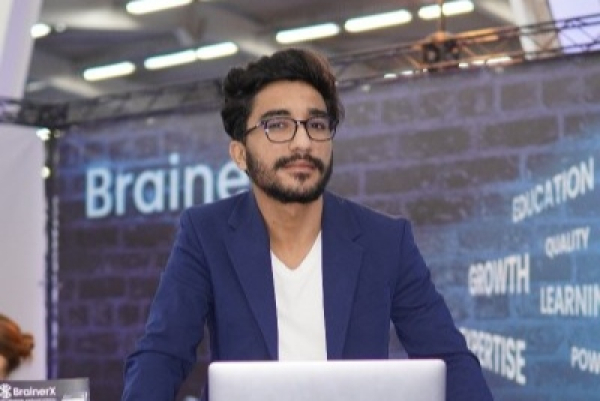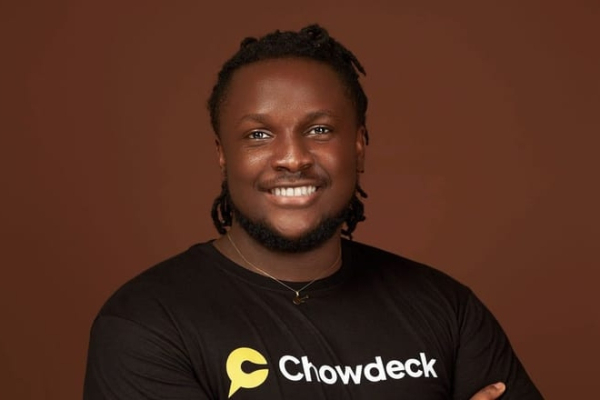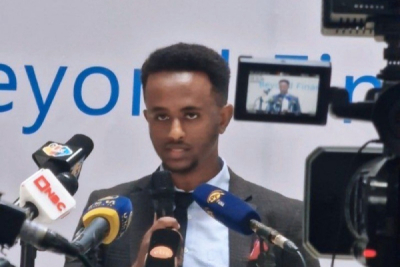
TECH STARS (1007)
His mission is to transform how Africans learn practical skills. He aims to equip them with the knowledge they desire in their chosen fields.
Dahou Meziane (photo), an Algerian computer scientist and entrepreneur, is the founder and CEO of BrainerX, a startup launched in 2023. His mission is to empower Africans with the tools to broaden their knowledge and excel in their areas of interest. BrainerX, through its mobile app, provides a wide array of hands-on courses. These include cybersecurity, programming, data science, e-commerce, graphic design, UI/UX, robotics, and artificial intelligence. The company also offers training in digital marketing and entrepreneurship.
BrainerX goes beyond merely offering courses by organizing events such as hackathons, workshops, and networking sessions. These initiatives aim to foster collaboration among entrepreneurs and professionals. Furthermore, competitions are organized to allow community members to excel, compete with their peers, and be rewarded for their achievements.
In addition to his involvement with BrainerX, Dahou Meziane is also the founder and general manager of Oktobit, an online store specializing in the sale of laptops and computer accessories. Oktobit offers a range of products suited to different customer profiles, whether they are students, programmers, graphic designers, or gamers.
A graduate of the National Higher School of Computer Science (ESI) in Algeria, where he obtained a master's degree in computer science in 2022, Dahou Meziane began his professional career in 2013 as a mobile application developer at Cible Vision training center. In September 2020, he joined the Algerian Insurance Company (SAA) as a mobile developer intern, before working as an Android engineer at SoBiapi in 2022.
Melchior Koba
As a software engineer, he is committed to developing technological solutions that simplify the daily lives of Africans. His startup, Chowdeck, is supported by several major investors.
Femi Aluko (photo), a Nigerian tech entrepreneur, co-founded and now leads Chowdeck, a company that bridges the gap between Nigerian vendors and consumers. Established in 2021 by Aluko, Olumide Ojo, and Lanre Yusuf, Chowdeck specializes in providing logistical services to both sellers and consumers. The company stands out for its ability to facilitate seamless meal deliveries for food vendors, offering consumers an intuitive platform to order meals from their preferred restaurants.
On April 30, 2024, the startup raised $2.5 million in seed funding from a group of investors that included YCombinator, Goodwater Capital, FounderX Ventures, HoaQ Fund, Levare Ventures, True Culture Funds, and Haleakala Ventures. “We are pleased with the success we have achieved to date and excited to have raised these funds that will enable us to replicate that success in more parts of Nigeria, and add value to our customers, vendors and riders in as many ways as we can,” Aluko commented.
Aluko, who graduated from Obafemi Awolowo University in 2015 with a Bachelor’s degree in Electrical and Electronic Engineering, began his professional journey in 2013 at Softblue Nigeria Ltd as a software engineer. Concurrently, he interned in the field support and projects department of Toptech Engineering.
In 2015, he joined the real estate tech startup Hutbay as a software engineer. The following year, he moved to Shopping Internet Services, where he served as a team leader. From 2017 to 2022, he brought his experience and skills to the fintech company Paystack, holding various positions such as software engineer, engineering director, technical manager, and lead engineer.
Melchior Koba
A professional accountant, he decided to venture into e-commerce. With his SNAPnSAVE solution, he revolutionizes the way consumers perceive their purchases.
South African entrepreneur Mark Bradshaw (photo), founder and CEO of SNAPnSAVE, has developed a platform that offers consumers cash back on their purchases. SNAPnSAVE, launched in 2015, is a cashback app that rewards users with money back each time they shop. Bradshaw explained in 2017 that their receipt technology allows shoppers to earn cash back wherever they shop by simply taking a photo of their receipt. The technology is enabled without any point-of-sale integration, allowing the product to scale into markets without barriers.
In addition to his role at SNAPnSAVE, Bradshaw serves on the advisory board of Therefour SA & UK, a consultancy that provides small and medium-sized businesses with access to strategic and operational expertise in areas such as finance, marketing, and IT, tailored to each company’s specific needs.
Prior to founding SNAPnSAVE, Bradshaw co-founded Kaboose in 2012, a startup that provides a mobile shopping tool for consumer goods at supermarkets. The platform enables customers to save on in-store purchases through exclusive coupons, find products that best suit their needs, and locate the best prices in nearby stores.
Bradshaw is a graduate of Stellenbosch University, where he earned a bachelor’s degree in accounting and business management in 2000. He also holds a chartered accountant diploma, obtained in 2004 from the SA Institute of Chartered Accountants.
Bradshaw began his professional career in 2002 at the accounting firm BDO Spencer Steward, where he worked as an auditor. In 2005, he joined Rebserve Cleaning Services as the financial and operations director. He later served as the commercial director at skincare company Union Swiss from 2008 to 2011.
Melchior Koba
Trained as an architect and passionate about technology, he has amassed solid expertise in the digital field. He now leads three technology companies, including Room.et, which focuses on real estate management.
Natnael Mekonnen Tsehay is an Ethiopian tech entrepreneur and the founder and CEO of Room.et, an online room-booking service for hotels, apartments, and guest houses. His aim is to change the way people book stays in Africa.
Founded in 2021, Room.et is an online hotel aggregator offering a virtual marketplace for available hotel rooms. With a dedicated website and mobile app, the platform allows users to discover and book hotel rooms based on criteria such as price, room type, and desired amenities, while offering various payment solutions.
A serial entrepreneur, Natnael Mekonnen Tsehay also founded WAKANDA Technologies in 2018, a company specializing in IT consulting, outsourcing services, and information technologies, helping businesses achieve their goals with modern digital solutions.
In 2019, he launched Ethiopian Business Daily, where he serves as the General Manager. The media outlet provides daily business news in Ethiopia, covering startups, business activities, trade regulations, and technology.
Natnael Mekonnen Tsehay holds a Bachelor's degree in Architecture obtained in 2019 from the Ethiopian Institute of Architecture, Building Construction and City Development (EIABC). He also holds a certificate in Real Estate Management from Addis Ababa University.
Melchior Koba
As a tech entrepreneur, he develops innovative solutions to improve access to healthcare. His commitment to public health in Africa has been widely praised.
Brian Turyabagye (photo) is a Ugandan tech entrepreneur who graduated from Makerere University in 2023 with a Master's in Telecommunications Engineering. He also holds a Master's in Business Administration from the Valar Institute, obtained in the same year. He is a co-founder and the CEO of MamaOpe Medicals, a healthtech company.
Founded in 2017, MamaOpe Medicals aims to improve access to quality healthcare, especially in resource-poor regions. It focuses on detecting and managing respiratory infections using innovative digital tools.
The medical device developed by this startup enables the early detection of vital signs of respiratory diseases, such as respiratory rate, lung anomalies, and heart rate, by analyzing different lung positions. Featuring a cloud platform, this tool provides healthcare professionals with a simple and fast way to make accurate diagnoses, thereby improving the chances of effective patient treatment.
Brian Turyabagye's professional career began in 2013 at the Uganda Communications Commission, where he was an intern. The following year, he also interned at iLabs@MAK, a research project at the College of Engineering, Design, Art, and Technology.
After his internship, iLabs@MAK hired him as an assistant team leader. In 2015, he was appointed as a software development consultant. Concurrently, he joined the NCBA Group, a banking group based in Kenya, as a systems manager. He worked there until 2018 before dedicating himself full-time to MamaOpe Medicals.
Recognized for his contributions to the medical sector, Turyabagye has received several awards, including the African Innovation Prize in Engineering from the Royal Academy of Engineering in 2016 and a mention among Africa’s brightest innovators at the Next Einstein Forum in 2018.
In 2022, MamaOpe was honored at the ASME's ISHOW Kenya competition, further confirming the significant impact of this enterprise in the healthcare sector.
Melchior Koba
Passionate about digital transformation, Mouhamadou Taha Thioye is dedicated to developing solutions that make life easier for all Senegalese people. His latest solution is a payment aggregator.
Senegalese tech entrepreneur Mouhamadou Taha Thioye (photo) is the founder and CEO of Keyzen, a company that simplifies the management of payment operations for Africans.
Established in 2023, Keyzen is a fintech firm that consolidates services for Visa prepaid cards, mobile money, and all other financial transactions into a single mobile application. This solution streamlines the process of purchasing and reloading Visa cards, while also facilitating the management of various payment channels.
Keyzen also allows Senegalese individuals to order their Visa cards and enjoy the convenience of one-day delivery. The company has already achieved a transaction volume exceeding 250 million CFA francs, equivalent to more than 400,000 US dollars.
Thioye earned a National Diploma in Telecommunications Engineering in 2004 from the National Institute of Posts and Telecommunications (INPT) in Senegal. He began his professional journey in 2004 at M2T (Morocco Transaction Processing), where he served as a development engineer.
In 2008, he joined ATPS SA, a technology company specializing in financial services, as a director in Senegal. By 2018, he had risen to the position of CEO of the holding company and its subsidiaries. He has played a significant role in establishing and developing the company’s subsidiaries in the WAEMU zone.
Melchior Koba
With more than two decades of experience in investment across Africa and beyond, he has now embarked on an entrepreneurial journey. His goal is to make access to credit a reality for all Africans.
Chijioke Dozie (photo), a Nigerian entrepreneur and investor, co-founded Carbon in 2012 with his brother, Ngozi Dozie. As the CEO, he is dedicated to making credit accessible to all Africans.
Carbon's mission is to ensure that everyone has the financial access they need to lead a dignified and prosperous life. The startup offers a range of services, including credit services, payment solutions, high-yield investment opportunities, and easy-to-use financial management tools, all aimed at empowering its users.
Headquartered in Lagos, Carbon has a team of over 90 employees and operates in both Nigeria and Ghana. The company, under the OneFi brand, has already launched several lending services, including the consumer loan mobile app, Paylater. To date, Carbon has served more than 3 million people.
Chijioke Dozie earned his Bachelor's degree in Economics from the University of East Anglia, UK, in 1999. He then obtained a Master's degree in Finance from the University of Reading in 2000. In 2008, he earned an MBA from Harvard Business School.
Before becoming an entrepreneur, Chijioke Dozie worked as an investment associate for the investment manager Zephyr Management from 2001 to 2004. He then joined the International Finance Corporation (IFC) as an investment analyst in 2004. In 2008, he became a partner at Kaizen Venture Partners, a private equity firm based in Lagos, Nigeria. From 2021 to 2022, he served as the chairman of the board for the media company, Pulse.
Melchior Koba
A seasoned agrotech entrepreneur with over eight years of experience, he empowers Egyptian agriculture professionals with innovative solutions.
Egyptian tech entrepreneur Fady Ibrahim (photo) is the co-founder and CEO of Cropsa. This platform, which he established in 2021 alongside Abanob Gamal, is designed to streamline the buying and selling of agricultural inputs and raw materials. By doing so, it aims to minimize production losses and bolster local farmers. Cropsa enables suppliers and traders in the agriculture industry to carry out their transactions online, enhancing the accessibility and efficiency of their operations.
Beyond its primary functions, Cropsa also features an advertising service known as Cropsa Business. This service allows users to advertise their products or services via a personalized dashboard. It provides tools for audience targeting and campaign creation, enabling users to effectively reach potential customers.
Cropsa also offers a recruitment service for agricultural enterprises, assisting them in finding talents that fit their specific requirements. Its recruitment platform allows users to evaluate and compare the most qualified candidates, thereby simplifying the hiring process.
Fady Ibrahim graduated from Ain Shams University in Egypt in 2019 with a bachelor’s degree in agriculture. He also earned a diploma in marketing from Harvard University in the same year. In 2021, he obtained a master’s degree in agricultural business and management from the Arab Academy for Science, Technology, and Maritime Transport.
Ibrahim began his professional journey in 2016 at Mazr3ty, a marketing services platform specializing in animal, poultry, and fish production, where he served as the marketing manager. He held the same role at the Central Food Safety Laboratory, a food safety lab, from 2017 to 2018. In 2018, he joined Spinneys Egypt, a supplier of food and household items, as the supervisor of research and development. From 2021 to 2022, he was the head of agriculture at Lychee, a company that delivers natural and fresh products like dairy and fruit juices to its customers.
In 2023, Forbes Middle East recognized Ibrahim named him one of the 30 most influential individuals under 30 in the “commerce and finance” category.
Melchior Koba
His goal is to simplify the process for businesses in Ethiopia to receive their payments. Leveraging the digital skills he gained in China, he is working on the development of a fintech platform named Chapa to fulfill this purpose.
Nael Hailemariam (photo), a co-founder and the CEO of Chapa, is leading the charge to streamline financial transactions between businesses and their clients in Ethiopia. Established in 2021, Chapa is a payment gateway that enables to easily entrepreneurs, small and medium-sized enterprises (SMEs), and large corporations to accept digital payments. Chapa’s comprehensive platform brings together various payment methods, including bank transfers, debit card transactions, and digital payments.
Chapa’s mission is to lower transaction fees, increase revenue, and boost operational efficiency for businesses. By addressing a broad spectrum of payment needs, the startup simplifies financial operations and fosters the development of innovative business models.
In addition to his role at Chapa, Hailemariam also serves on the board of the Innovative Finance Lab Ethiopia, an organization dedicated to enhancing access to financing for SMEs and startups in Ethiopia. This initiative is a collaborative effort between the National Bank of Ethiopia and the United Nations Development Programme (UNDP).
Hailemariam holds a bachelor’s degree in computer science from Addis Ababa University, earned in 2014, and a bachelor’s degree in electronic and information engineering from Beihang University in Beijing, earned in 2018. He completed a master’s degree in data science and computer engineering at Tsinghua University in China in 2021.
Prior to embarking on his entrepreneurial journey, Hailemariam gained invaluable experience as an assistant professor of computer science at Beihang University from 2017 to 2018. From 2019 to 2020, he served as the director of the Design + Space Laboratory at Tsinghua University, a design lab and workspace for students.
Melchior Koba
After completing her university studies in computer science in London, she returned to Gambia. She is now contributing to her country's development by fostering entrepreneurship and technological innovation.
Beran Dondeh Gillen (photo), a Gambian entrepreneur and computer scientist, co-founded and currently serves as the CEO of The Hub. Established in October 2019, The Hub is a technology incubator dedicated to filling the gaps in Gambia’s entrepreneurial ecosystem.
The Hub is devoted to aiding entrepreneurs in their journey by offering incubation programs, training, acceleration sessions, and mentorship and coaching opportunities. It also provides modern, collaborative workspaces. The Hub caters to a diverse array of entrepreneurs, including young adults aged between 18 and 35, and aims to impact 1,500 individuals by 2025. To date, it has supported over 194 entrepreneurs, benefited more than 953 individuals through its programs, organized over 37 events, and conducted more than 30 training sessions.
In addition to her role at The Hub, Gillen holds a directorial position at Morem Consulting and Advisory Services, a firm specializing in financial and technical consulting. She also serves as the chairperson of the Information Technology Association of The Gambia.
Gillen is a graduate of Middlesex University in London, where she earned a Master’s degree in Network Management in 2006. She embarked on her professional journey in 2002 at De La Rue, a security company, serving as a project manager. In 2007, she transitioned to the fintech company EazyPAY, taking on the role of Director of Operations.
In October 2023, Gillen was recognized as the “ICT Icon of the Year” at the ICT Expo in Gambia, a testament to her dedication and significant contributions to the advancement of technology and entrepreneurship in Gambia.
Melchior Koba
More...
After studying diplomacy in the United States, she returned to Congo-Brazzaville and ventured into digital communication. Her professional achievements earned her a national award.
Cindy Gamassa (photo), a Congolese entrepreneur and the founder and CEO of Numerika, assists businesses and brands in effective communication. On April 18, 2024, during the digital forum in Congo-Brazzaville, she received the award for the best Female-founded startup.
Established in 2020, Numerika offers its clients a comprehensive range of services from communication strategy to operational implementation, aiming to maximize business impact. Its areas of expertise include digital marketing and communication, online community management, and web development.
This award is the Congo’s way of celebrating Cindy Gamassa's commitment and dedication to her work. "True recognition comes when one's own country acknowledges their efforts and hard work. For this invaluable support, I extend my heartfelt gratitude to the organizers of the digital forum, including the World Bank's PATEN project, Deloitte, the European Bank, the NGO Pratic, and the Ministry of Posts and Telecommunications," Cindy Gamassa stated.
In addition to her role at Numerika, since June 2022, Cindy Gamassa has been serving as a mission officer at the Ministry of Posts, Telecommunications, and Digital Economy. She is also the founder of the Sisterhood Network, a network aimed at creating a community of women supporting each other's personal and professional ambitions.
Cindy Gamassa holds a bachelor's degree in law obtained in 2014 from the Catholic University of Lyon in France and a bachelor's degree in business and international relations from Oglethorpe University in the United States, obtained in 2019.
Melchior Koba
She embodies the spirit of innovation and commitment to a more sustainable future in Africa. In just one year of existence, her startup has already received national recognition.
Cynthia Umutoniwabo (photo), co-founder and CEO of Loopa, is on a mission to create a cleaner and smarter Africa. Hailing from Rwanda, she launched Loopa in 2023 under the Jasiri Talent Investor program in Kigali. The startup is quickly becoming a significant force in the climate technology sector, with its focus on transforming waste management through circular economy solutions.
Loopa targets organic waste and uses an innovative technological process to transform this waste into nutrient-rich organic fertilizers. These fertilizers are not only accessible but also affordable for small-scale farmers in Africa. By harnessing the power of the Internet of Things (IoT), Loopa optimizes this conversion process, offering an efficient and sustainable solution.
Cynthia Umutoniwabo has been serving as the deputy administrator of Cornwine, a Rwandan audiovisual production company, since September 2022. She is a software engineering graduate from Moringa School in 2021 and also holds a certification in tourism and service excellence from Cornell University.
Her professional journey includes a stint at the American hair salon Abby Hair Salon, where she worked as the operations manager from 2012 to 2018. In January 2022, she joined the Rwandan creative agency Dutch Tembo as the sales and marketing manager, a role she held for seven months.
Cynthia’s dedication to innovation was recognized in December 2023 when she was awarded the Innovator of the Year by Rwandan President Paul Kagame. This award acknowledges her exceptional contribution to the development of sustainable solutions in Africa.
Melchior Koba
She is dedicated to bridging the health gap for women. Her leadership and the impact of her company have earned her several awards and recognitions.
Berabose Aline Joyce, a tech entrepreneur from Rwanda, is the co-founder and CEO of Luna, a startup that offers digital health and wellness services for women across Africa. As Berabose described in 2023, Luna serves as a secure community platform where women can access reliable and safe products and services. Launched in 2022, Luna enables women to anonymously engage with other women and experts on key topics such as mental health, sexual and menstrual health, and maternity. Its mission is to simplify women’s access to trusted health specialists.
Luna’s primary services include Luna Health, a platform for consultations with certified doctors, and Luna Shop, an e-commerce platform that provides essential health and wellness products for women.
Before Luna, in 2016, Berabose Aline Joyce co-founded the African Dream Movement, a Pan-African organization dedicated to sustainable development and people’s well-being, where she served as the program director until 2019.
Berabose Aline Joyce completed her bachelor’s degree in Business and International Relations from Kigali Independent University in 2023. She also earned a diploma in Gender Studies, Menstrual Equity, Hygiene, and Management from the Clinton Global Initiative University in 2021.
She embarked on her professional journey in 2017 at AC Group Rwanda, a firm offering smart and interactive IT solutions, where she held the position of a marketing manager. In 2020, she transitioned to a consultant role for the Westerwelle Startup Haus Kigali incubator, powered by Evonik Stiftung. Her diverse career has seen her traverse multiple fields. In 2021, she took on the role of Head of Strategy at Right Venture Creative, a creative and communication agency.
In addition, she serves as the CEO of Kunda Eco — Arts Space, a company that creates and promotes recycled art and craft objects in Rwanda. In 2022, she joined Simbuka Technological Innovation, a social enterprise specializing in water-related technologies and solutions.
Berabose Aline Joyce’s exceptional leadership has been recognized widely. In 2023, she was named among the 32 Rwandan women changemakers, and in 2024, she received the prestigious Women in Leadership (WIL Award) in the health and wellness category.
Melchior Koba
Upon concluding his academic journey in Canada, he made his way back to Côte d’Ivoire, fueled by a vision to transform the agricultural landscape of Africa. His technological innovations in this realm have earned him numerous accolades and honors.
Aboubakar Karim is an Ivorian agroeconomist and entrepreneur. He is the co-founder and CEO of Investiv Group, dedicated to developing innovative solutions to support small-scale farmers in Côte d’Ivoire and throughout West Africa. Founded in 2017, Investiv Group specializes in precision agriculture and the use of drones in the agricultural sector. "With Investiv, we aim to contribute to building the future of African agriculture by focusing on digital transformation and precision agriculture tools," the entrepreneur says.
The startup's services are diverse, including mapping, phytosanitary diagnostics, and aerial spraying, all performed by drones. It also offers customized software solutions to its clients. Its clear goal is to help farmers reduce losses due to phytosanitary issues, precisely monitor the condition and size of their lands, and conduct essential technical studies for their agricultural projects.
In addition to his entrepreneurial commitment, Aboubakar Karim is the founder and director of the Côte d'Ivoire Flying Lab, an initiative affiliated with the We Robotics Organization. This community promotes the use of drones, robotics, and STEM for development and youth empowerment.
Karim graduated from Laval University in Canada in 2016 with a bachelor's degree in agricultural economics. His professional career began in 2016 at the Ministry of Agriculture, Fisheries, and Food of Quebec, where he was an agroeconomist in the agri-food marketing and regional development service. Between 2021 and 2022, he worked as a business analyst at the Society for Cooperation for International Development (SOCODEVI) in Canada.
His innovations have earned him several distinctions, including the third prize in the African Startup Competition organized by Ecole Polytechnique de Paris in 2018, and a place in the top 10 of Africa's Business Heroes in 2020.
Melchior Koba















